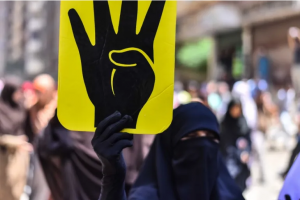In Egypt, the space for political dissent is as small as most can remember.
A decade on from the Rabaa massacre, when at least 900 protesters were killed demonstrating against the overthrow of President Mohamed Morsi in a military coup, current President Abdel Fattah el-Sisi – the man who removed Morsi – has little domestic opposition to worry about.
As for the Muslim Brotherhood (MB), the group that Morsi was a member of when he assumed the presidency for a year in 2012, they still appear politically weak, with divisions over what the next steps should be.
Even the space outside Egypt for exiled members of the MB to operate has gotten smaller, with a rapprochement between Turkey and Egypt meaning that Ankara is less welcoming to its territory being used as a base for anti-Sisi campaigns.
It is a far cry from the MB’s electoral victories in the immediate aftermath of Egypt’s 2011 revolution, which overthrew longtime President Hosni Mubarak.
Ultimately, this has led to questions being posed about the organisation’s continuing legacy as a political force.
“Things are looking rather bleak for the MB right now, but they have overcome similar crises before,” Joas Wagemakers, an associate professor of Islamic and Arabic studies at Utrecht University and an MB specialist, told Al Jazeera.
Wagemakers believes the MB is still relevant – even though it has less space to operate in the changing politics of the Middle East, he says, it can always expand operations in Western countries.
The MB elected Salah Abdulhaq in March as its new acting General Guide following the passing of Ibrahim Munir who was based in London. Abdulhaq kept a low profile for decades, which many hypothesised may have played a big role in his being chosen by an organisation seeking a new start.
According to Amr El Afifi, an MB specialist and one of the authors of Broken Bonds: The Existential Crisis of Egypt’s Muslim Brotherhood, the group has grappled with three concurrent crises: an identity crisis, a legitimacy crisis, and a membership crisis.
“The organisation was shaped by the successive repressive waves it endured, and thereby failed at many junctures to define itself on its own terms and offer a comprehensive social and political outlook or manifesto,” argued El Afifi.
Al Jazeera contacted MB spokesperson Suhayb Abdel Maqsud for comment but no response was received.
Identity crisis
It can be argued that the MB’s nearly 100-year-old texts do not define a clear ideological platform on various issues, including political violence, women’s place in society, and the role of minorities in a Muslim society. Proponents of this view say it has given rise to an inevitable split between conservative and progressive members.
But, with some notable exceptions, the MB has by design avoided taking clear stands on many issues, like violence.
Despite the efforts of successive generations of MB leaders who wrote extensively against political violence, some members have interpreted foundational MB and Islamic texts differently.
The MB’s platform was ambiguous regarding the use of violence during the life of its founder Hasan al-Banna. While he was against revolutions, he said the Muslim Brotherhood would use “practical force” if necessary to achieve its goals, explained El Afifi.
This ambiguity led some prominent figures within the movement, at different points in its long history, to split over the use of violence, with each side finding arguments in al-Banna’s work to support their view.
“If the MB wants to continue to be viable, it will have to define itself more precisely. It cannot continue to exist as a one-stop shop for everything Islamic,” El Afifi said.
Since the toppling of Morsi, who subsequently passed away in prison in 2019, the MB has struggled with this dilemma.
Mohamed Kamal, one of the leaders of the group’s High Administrative Committee, designed a three-stage plan of targeted violence against the Egyptian authorities. Senior members of the organisation rejected this, adhering to the dominant stance against political violence.
“The 2013 split within the MB cleaved it into two camps: Those who have given up on the Egyptian government and those who still see hope in peaceful change,” Wagemakers explained.
“The MB is currently prone to radicalisation due to state repression, but I do not think that this radicalisation will reach the level of the 1950s and 1960s,” Wagemakers told Al Jazeera.
In the 1950s and 1960s, he explained, the MB had split into two camps under the pressure of the state’s repression and imprisonment of its members. One camp kept channels open with the government while the other saw the only way forward as direct violent confrontations with the rulers.
Legitimacy crisis
The identity crisis overlaps with a legitimacy crisis. The new generation of young members who have endured repression and prison sentences feel their experiences put them on an equal footing with the older generation of the mid-20th century.
This situation makes it difficult for younger members to accept the moral authority of the old guard, Wagemakers said, while the MB prioritises “moral authority”, insisting on choosing older leaders.
“They were jailed and tortured by the [Gamal Abdel Nasser] government,” Wagemakers said. “This gives them enormous moral authority within the organisation. These are the members who experienced the mihna (ordeal) of the 1950s and 1960s.”
But many of these older leaders do not have fresh ideas that can placate a restless younger generation, thus creating further fissures within the organisation.
El Afifi sees this mihna-based legitimacy as obsolete, especially since younger members have already experienced their own ordeal over the past decade. Instead, he believes, the MB must find new forms of legitimacy if it is to maintain its moral authority over its members.
Organisational crisis
The third crisis facing the MB is the organisational blow it suffered due to the detention, killing and exile of many of its leaders.
“Changes in the political and social context have rendered the traditional recruitment and retention mechanisms of the MB obsolete,” El Afifi said.
The geographical dispersion of MB members adds a layer of organisational complexity the leadership has not been able to address, given the loss of institutional and organisational memory it entails.
Instead, according to El Afifi and his co-author Abdelrahman Ayyash in Broken Bonds, second-tier, inexperienced members have risen through the ranks in what is described as “crisis promotions”.
The leadership vacuum led to junior students taking on immense organisational responsibilities with little oversight from more senior members, which explains the ability of some younger members to use violent means without much oversight from the historical leadership.
Despite the challenges facing the MB and the bleak picture drawn by scholars of political Islamist movements, Wagemakers affirms that as long as there are socially conservative societies with corrupt and autocratic leaders in the Middle East, people will want Islamist opposition groups that strive to make things better.
“The MB is down, but not out,” he said.











Comments